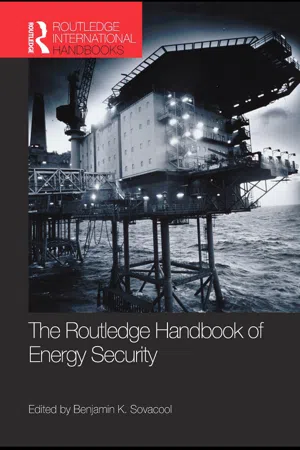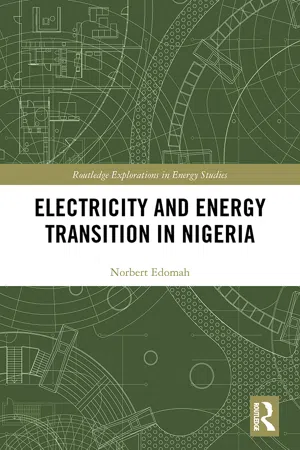Energy Supply
Energy supply refers to the provision of energy sources such as electricity, natural gas, and renewable energy to meet the demands of society. It encompasses the production, distribution, and consumption of energy, and is crucial for powering industries, transportation, and households. The availability and sustainability of energy supply have significant implications for economic development and environmental sustainability.
4 Key excerpts on "Energy Supply"
- eBook - ePub
- Zhenya Liu(Author)
- 2015(Publication Date)
- Academic Press(Publisher)
...Supply 123 4.2 Large-Scale Clean Energy Bases on Each Continent 124 4.3 Distributed Energy Development 150 4.4 Development and Utilization of Fossil Energy 153 5 Global Electricity Flow 157 5.1 Reasoning and Principles Behind Global Electricity Flow 157 5.2 Overview of Global Electricity Supply 159 5.3 Electricity Supply and Demand Balance on Each Continent 162 5.4 Development Trend of Global Electricity Flow 172 Summary 181 1. Major Factors Nowadays, energy development is closely associated and aligned with socioeconomic development. It determines the close link that Energy Supply and demand has with economy, society, the environment and resources. Generally speaking, socioeconomic development, energy resource endowment, energy environment constraints, technological progress, and energy policy regulation are the five major factors that influence Energy Supply and demand (See Fig. 4.1). In particular, socioeconomic development, including economic and population growth, industrialization, and urbanization, determines the growth trend of gross energy demand and regional distribution. The reserves and distribution of energy resources determine the supply potential, structure, and distribution of energy. Energy and environmental constraints restrict the overall level, structure and way of mankind’s utilization of energy resources to meet energy demand. As the Earth’s ecological environment deteriorates, its impact on energy consumption, supply structure, and structural readjustment has become increasingly prominent. Energy technological advancement and energy policy regulation mirror the combined effect of science and technology and government regulation on economy, energy, and the environment. Energy technological progress is a major decisive factor in directly determining the efficiency of energy production and consumption as well as environmental emissions...
- eBook - ePub
- Kornelis Blok, Evert Nieuwlaar(Authors)
- 2016(Publication Date)
- Routledge(Publisher)
...For instance, in the case of oil we have seen horizontal drilling, which makes better resource utilisation possible; much more efficient passenger cars; and the shift to coal and natural gas in the power sector. Nevertheless, concerns about future supply will probably stay with us. At the same time, if mitigation of climate change is taken seriously, we need to reduce greenhouse gas emissions to net zero in the second half of this century. It then becomes very unlikely that fossil fuels can ever be depleted. Geopolitical concerns. The total global availability of energy is one thing; the distribution across regions is another. Especially crude oil, natural gas and to some extent uranium are distributed unevenly across the globe. The first serious oil crisis took place in 1973, as a consequence of the Yom Kippur War between Israel and its neighbouring countries. This led a group of Arab oil producing countries to proclaim an oil embargo against the USA and other allies of Israel. In the end, the embargo did not result in actual supply disruptions. However, it did lead to a strong increase in oil prices and the event showed the vulnerability of oil supply when production is dominated by a limited group of countries. A more recent event is the threat of the disruption of natural gas supply from Russia to Ukraine. Since 2005 there have been disputes on natural gas prices and debt payments between these countries. As a result, Russia has regularly cut off natural gas supply to Ukraine. As most of the natural gas exports from Russia to Central Europe flow through pipelines through Ukraine, this also threatens natural gas supply to these countries. Actual supply disruptions occurred in several countries in Central Europe in January 2009. 1.5 Energy and sustainable development Sustainable development is a concept that has attracted broad interest since the publication of the report Our Common Future in 1987 by the World Commission on Environment and Development...
- eBook - ePub
- Benjamin K. Sovacool, Benjamin K. Sovacool(Authors)
- 2010(Publication Date)
- Routledge(Publisher)
...4 THE SUSTAINABLE DEVELOPMENT DIMENSION OF ENERGY SECURITY Asclepias R. S. Indriyanto, Dwi Ari Fauzi, and Alfa Firdaus Introduction The world’s historic reliance on oil has influenced many aspects of human life, from political platforms and economic policies to business practices and the daily energy decisions of individuals. The world is now facing manifold energy-related challenges from many directions and in various forms, as our fondness for oil and other fossil fuels has been identified as a significant contributor to global warming. This chapter highlights three wide-ranging principles, namely energy security, sustainable development, and governance, that can help us see through the complexities of the energy challenges we are facing. As many other chapters in this book reveal, perspectives on energy security evolve through time. Energy security concerns were initially centered on the availability of energy, and the center of attention was on the primary Energy Supply side, especially crude oil. However, in recent years it has been widely recognized that energy availability can be affected by various factors in each segment of the energy industry, as well as in interactions among those segments. Major concerns remain in relation to the sufficiency of supply and the quality of energy services. However, prices and various economic arrangements are also important since they dictate the quantity and quality of energy provision, as well as the pattern of energy consumption. Further, activities in all segments of the energy sector impact society, ecology, and the environment in general, which in turn directly or indirectly affect the supply and demand of energy and therefore energy security as well...
- eBook - ePub
- Norbert Edomah(Author)
- 2020(Publication Date)
- Routledge(Publisher)
...The fundamental agreements and trust – without which politics cannot advance as a civilizing process – are provided by the cultural framework that offers sound rules for the political game. 30 Investment decisions are becoming more difficult due to the rising levels of uncertainty in forms of changing geopolitical alliances in forming energy deals, geopolitical trends that impact on energy production, fluctuations in energy prices and trade dynamics, issues of poor governance and political instability, threats to infrastructural facilities, and other environmental concerns. 31 Considering possible threats to successful investment in new energy infrastructure, the International Energy Agency (IEA) argues that aside from the rising capital investment cost, other major factors include geopolitical concerns which highlights the issue of energy security as the stubborn part of the decision-making process. 32 Climate change, which constitutes a change in regional and global climate patterns, is also a factor that has to be considered in the choice of Energy Supply infrastructure. 33 Considering theoretical perspectives As a follow-up to the arguments of the preceding sub-section, I hereby argue that Energy Supply, in the strict sense of the word, is not created but is caused. The cause can come in various ways, such as government high-level decisions on new energy infrastructure when there is not high demand for it. The fact that the infrastructure is available now leads to a shift to the use of that infrastructure. In this case, the demand is caused by the initial provision of that infrastructure. Another cause can be the consumerist nature of people in society. Attitudinal biases, culture, and beliefs, which influence people’s social practices (which can be very energy intensive) also contribute to increased energy demand, which then impacts on Energy Supply infrastructure...



